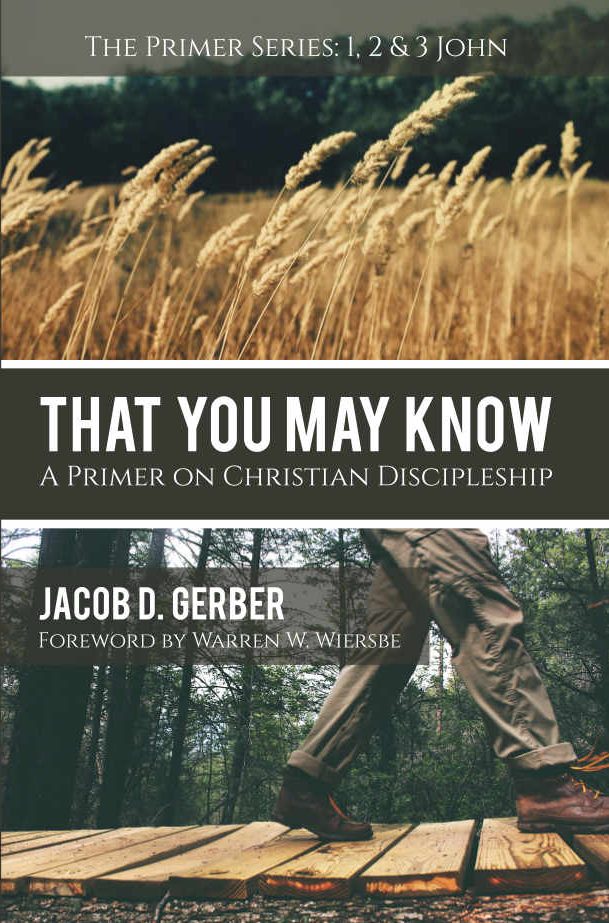Books

While there are many books written about Christian discipleship, there are not nearly enough books on discipleship that primarily expound the Bible itself. The Apostle John wrote three letters, however, with the main purpose of helping disciples to grow.
That You May Know: A Primer on Christian Discipleship is an enriching study that will lead you through John’s teaching on following Jesus as a disciple.
This book is more than a commentary and more than a topical book on the subject of Christian discipleship. Instead, this is a primer on Christian discipleship written as a careful reading of God’s word in 1, 2 & 3 John. It’s ideal for your own individual devotional reading or as a helpful resource for your group Bible study.
Download the First Two Chapters of That You May Know for Free
Bible Studies: Paul's Letter to the Philippians
Studies from my forthcoming pastoral commentary on Paul’s Letter to the Philippians, Have This Mind: A Primer on the Cruciform Life.
Access the complete set of Bible studies from Philippians here.
Bible Studies: The Gospel of John
Access the complete set of Bible studies from the Gospel of John here.
Bible Studies: The Book of Genesis
Access the complete set of Bible studies from Genesis here.
Genesis 3:8–24: The Curse
When Yahweh God confronts the rebellion of Adam and Eve, he curses his creation while still extending them mercy. (Exposition of Genesis 3:8–24)
Genesis 3:1–7: The Fall
Satan’s strategy for luring us into sin is fairly consistent. He tempts us to doubt whether God’s word is good, true, and relevant. (Exposition of Genesis 3:1–7)
Genesis 2:4–25: Humanity
Genesis 2:4–25 is the most important reflection on human nature, human work, and human marriage. (Exposition of Genesis 2:4–25)
Genesis 1:1–2:3: Creation
Beyond telling us what happened at the beginning of time, Genesis 1:1–2:3 tells us why it happened and what God’s work in creation means for our lives today. (Exposition of Genesis 1:1–2:3)
Bible Studies: Paul's First Letter to the Corinthians
Access the current set of Bible studies from 1 Corinthians here.
Bible Studies: The Letters of John
Access the complete set of Bible studies from the Letters of John here.
Bible Studies: The Gospel of Luke
Access a handful of Bible studies from the Gospel of Luke here. These were studies written during the Advent season of 2018. At the moment, I do not have plans to continue working through the Gospel of Luke; however, I wanted to make these few studies available online for whomever may benefit from them.
Bible Studies: The Book of Ecclesiastes
Access the complete set of Bible studies from the Book of Ecclesiastes here.
Bible Studies: The Gospel of Matthew
Matthew 14:13–21: Compassion for our Needs
While Jesus cares for his own needs to grieve the death of John the Baptist, Jesus has compassion for our needs. (Exposition of Matthew 14:13–21)
Matthew 14:1–12: Seeking a Good Conscience
In the contrast between Herod’s evil and John the Baptist’s faithfulness, we see an important principle: get and keep a good conscience. (Exposition of Matthew 14:1–12)
Matthew 13:51–58: Discipled for the Kingdom
As Jesus closes his parables of the kingdom, he draws a clear line: there is no neutrality between kingdom disciples and kingdom despisers. (Exposition of Matthew 13:51–58)
Matthew 13:44–50: The Parables of the Treasure, Pearl, and the Net
As Jesus concludes his kingdom parables in Matthew 13, he gives promises and warnings. The kingdom of heaven is a two-edged sword. (Exposition of Matthew 13:44–50)
Matthew 13:31–35: The Parables of the Mustard Seed and the Leaven
From small and obscure beginnings, and through secret and hidden development, the kingdom of heaven will come by surprise. (Exposition of Matthew 13:31–35)
Matthew 13:24–30, 36–43: The Parable of the Weeds
In the parable of the weeds, Jesus explains why the Son of Man is delaying final justice in the world. Wait patiently for the kingdom. (Exposition of Matthew 13:24–30, 36–43)










